Newt Gingrich’s sharp rebuke of CNN moderator John King’s probing into his second wife’s claim that he asked for an “open marriage” to accommodate the woman who became his third wife abruptly derailed further discussion of the issue then and there, but it won’t be dropped – especially since his surge and victory in the South Carolina primary in his quest for the Republican presidential nomination.

Gingrich, first wife Jackie and their two children, 1980, with second wife Marianne, 1994. and with third wife Callista 2011.
The media may be guilty of generating drama that doesn’t exist but attempting to detect hypocrisy in a man whose first congressional campaign was won on the slogan of “Let Our Family Represent Your Family” is legitimate when such a flaw in a President can affect a nation’s direction. Obama has already learned that making his birth certificate public can delegitimize a false charge questioning place of birth and Romney may discover that making multiple tax returns public will let him more dramatically prove his business ability, given the false assumption he began with an inheritance. While media probes into Gingrich’s divorce from first wife Jackie and concurrent affair with second wife Marianne and divorce from Marianne and concurrent affair with third wife Callista provide prurient gossip for media drama, unanswered questions about his private life also raise implications about his character. As a former history professor, Gingrich is likely familiar with the record of those before him who faced charges of fathering illegitimate children, and the circumstances of divorce and adultery.
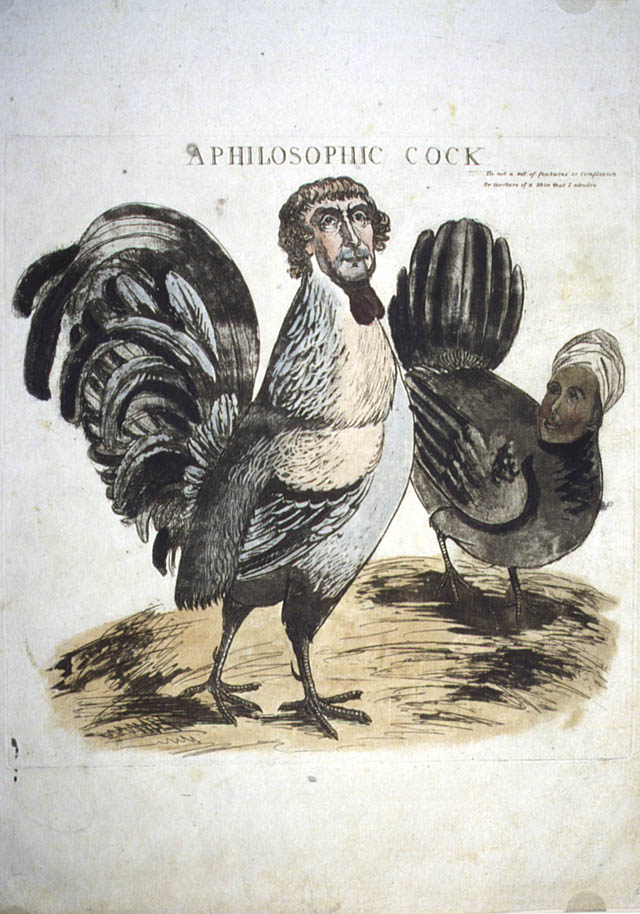
A cartoon depicting Jeffrerson and Sally Hemings.
Allegations that Thomas Jefferson fathered children by his slave Sally Hemings first went public two years after his 1800 election, in a series of newspaper stories, the initial one appearing in the September 1, 1802 Richmond Recorder. That it had no appreciable impact on his 1804 re-election was due more to the different election process at that time. The scandal did, however, suggest hypocrisy about the slave-owning author of the Declaration of Independence, but his status as a widower as well as the ignorant racism which devalued anyone who wasn’t white seemed to mitigate it.
Richard Mentor Johnson, elected Vice President with Martin Van Buren as President in 1836, was different from Jefferson in that he openly acknowledged that he’d had a mixed-race slave mistress Julia Chinn, by whom he fathered two daughters. Although Chinn had died three years before the election, by then Johnson had begunand ended a second love affair with another woman slave, and then a third, with the second woman’s teenage sister. It was not that his was a common-law marriage with the late Julia Chinn but that she’d been of mixed-race which angered some of his fellow Kentuckians, who refused to support him. In the context of that era, however, many southerners nevertheless supported him because, despite his proclaimed love for Julia, he had upheld the institution of slavery and refused to support the abolition movement. He was also popular for leading the fight to end debtor’s prison in the U.S. and upholding the separation of church and state.
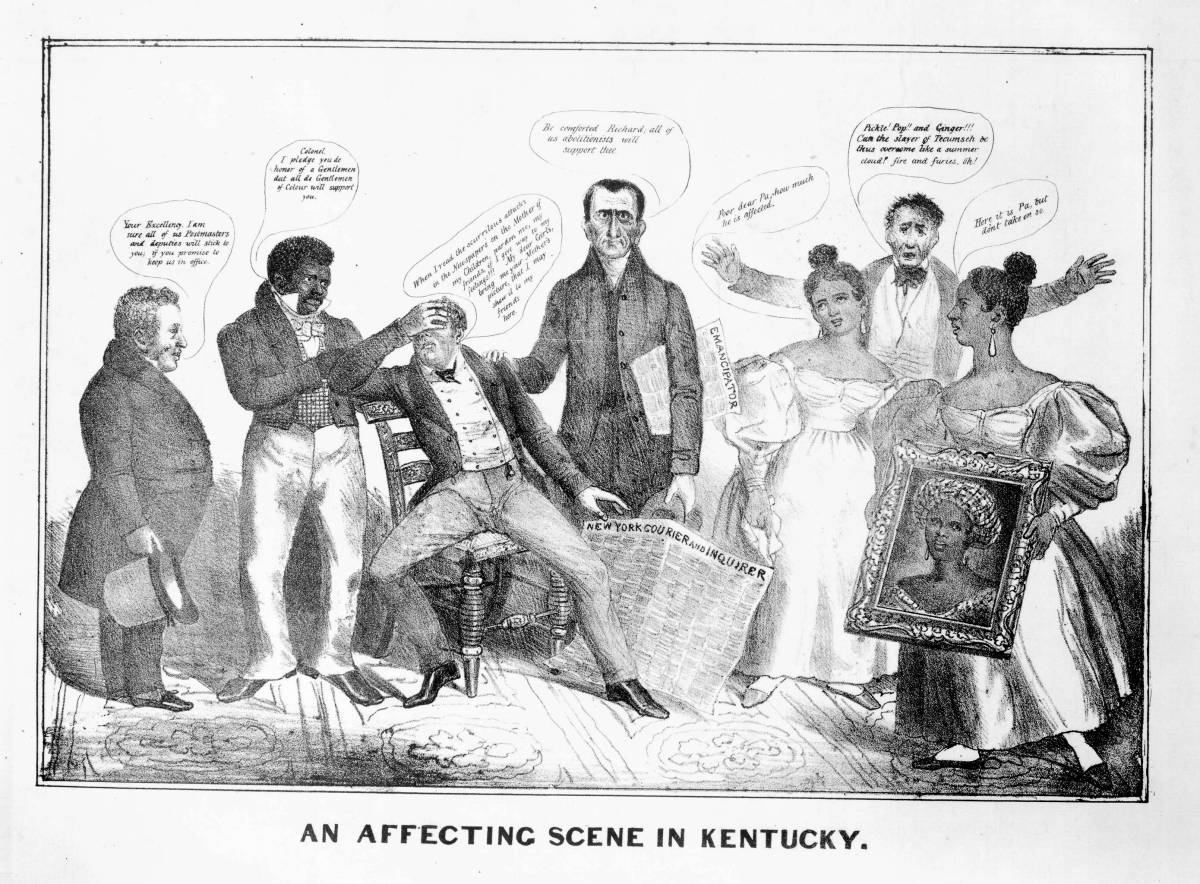
A contemporary political cartoon referencing Vice Presidential candidate Richard Johnson’s two daughters by his common-law wife, an African-American slave.
No Presidential candidate better used the charge of fathering a bastard child to his political advantage than did Democrat Grover Cleveland in the 1884 election.
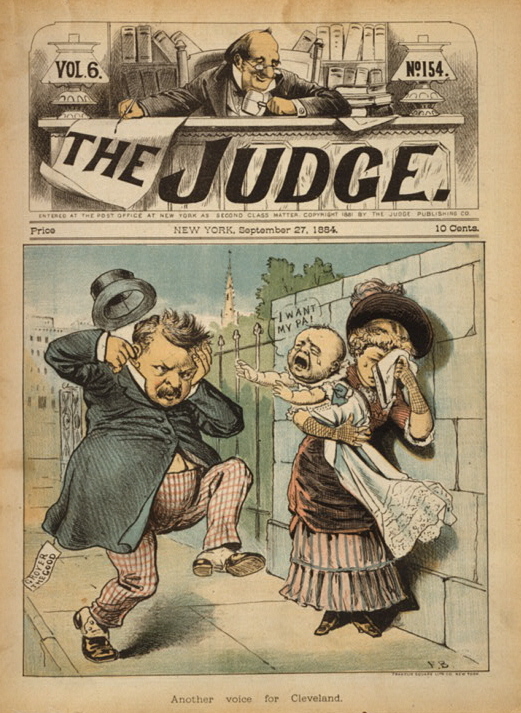
The Grover Cleveland paternity caricature.
The bachelor seemed almost untroubled by a Buffalo Evening News front-page headline of “A Terrible Tale,” in July of 1884. The story told of a Maria Halpin who’d given birth to an illegitimate son by Cleveland and that, to keep her silent about it all, he’d had her illegally committed to an insane asylum, suggesting it was proof that as President, Cleveland would rule with the same reckless behavior and disregard for the law. It led to the Judge Magazine cartoon depicting him enraged at the sight of the woman and child, and the famous ditty, “Ma! Ma! Where’s my Pa? Gone to the White House! Ha! Ha! Ha!” Rather than backpedal on his reformist mantra of “Above all, tell the truth,” Cleveland declared that the charge of his institutionalizing Halpin was an outright lie, but that he may indeed have been the baby’s father – among several other men. Cleveland was recast as the honest candidate.
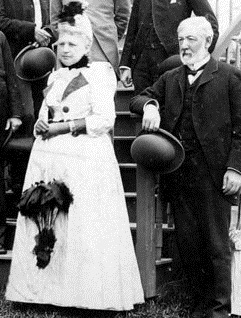
Harriet and James G. Blaine, she had been a pregnant bride.
Weeks later, the Indiana Sentinel pointedly examined the fact that Harriet Blaine, the wife of his opponent, Republican James G. Blaine had given birth to their first son just three months after their marriage. After initially threatening to sue the paper for libel, Blaine circulated an odd story that he’d actually first wed his wife in secret, pre-dating her pregnancy. Finally, his supporters made the case that once he had indeed impregnated the former Miss Stanwood, Blaine had gone ahead and married her because it was just. Thus, Cleveland used illegitimate pregnancy to prove his scrupulous honesty while Blaine used it to prove his honor to duty.
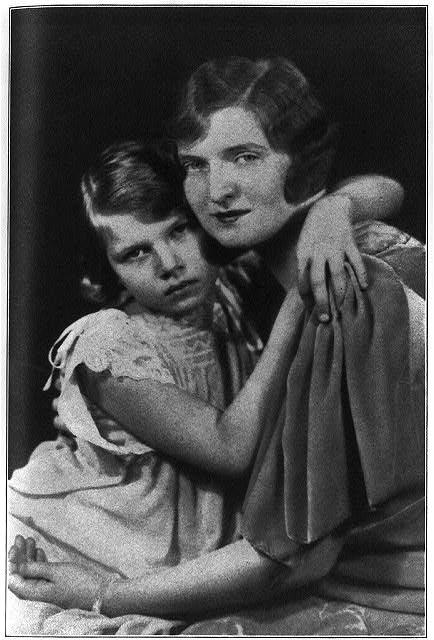
Nan Britton and her daughter.
Racism returned a century after the Jefferson and Hemings story in the gossip gathered and spread by Wooster College (Ohio) professor William Chancellor in his effort to damage the 1920 Republican candidate Warren Harding. Printed handbills Chancellor circulated at the convention that summer stated not just that Harding was of mixed ancestry, but had fathered a child by a Latina woman and then paid to terminate the pregnancy Although teenage campaign volunteer Nan Britton had recently given birth to a daughter out of wedlock, it would be seven years (four years after Harding’s death) before she would state her claim that the child had been fathered by Harding.
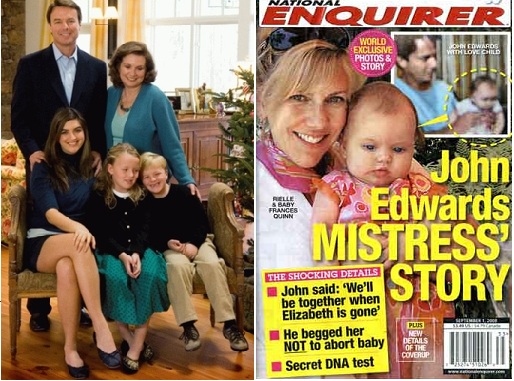
John Edwards with his wife Elizabeth and their children; John Edwards’ mistress Rielle Hunter and their child.
No effort to make public the accusation that a presidential candidate had just fathered a bastard daughter was more blatant and persistent than the most recent one, of 2008 Democratic primary candidate John Edwards. What made the claim of Edwards’s affair with videographer Rielle Hunter and her pregnancy unique was that it was generated not by anyone in the campaigns of his Democratic rivals for the nomination or any Republicans he could potentially face in the fall of 2008, but by the National Enquirer tabloid in October of 2007. Hunter gave birth to their child in February of 2008, months before Barack Obama won the Democratic nomination. In July, The Enquirer definitively affirmed that Edwards was the child’s father in July. On August 8, Edwards admitted to the affair but denied his paternity of Hunter’s daughter, Quinn. Up until that time, he had allowed the presumed nominee Obama to keep him on a short list of potential Vice Presidential running mates, a decision he announced on August 22, choosing Senator Joe Biden. Not until January 2010 did Edwards admit to lying about his fathering the Hunter child, but was under criminal investigation for diversion of funds used to cover up the affair.
Adultery
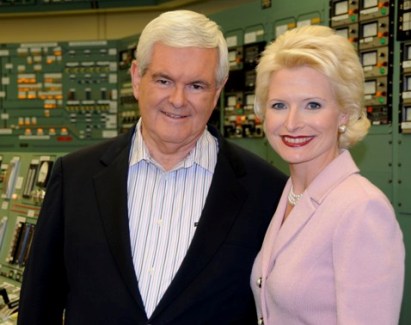
The Gingrichs.
Given the focus on how Gingrich’s second mistress became his third wife, (the New Yorker has a current look into it at: http://www.newyorker.com/reporting/2012/01/23/120123fa_fact_levy?currentPage=all ) presidential candidates having to cope with inconvenient women comes relatively late in the game. Ironically, the first time such a dilemma seemed to pose a threat, it was generated from within the candidate’s own campaign.
It was while vacationing in Bermuda without his wife Ellen that New Jersey Governor Woodrow Wilson first met the divorced Mary Hulbert Peck. Although he always denied having had sex with her, he did confess they developed strong emotional intimacy for each other. “I found him longing to make up as best he might for play long denied. That, I think, is why he turned to me,” Mary Peck recalled. Lurid gossip about the pair began circulating during his 1912 presidential campaign, but when one story told of them playing on blankets behind some bushes in Bermuda, not even his opponent, Progressive candidate Theodore Roosevelt could imagine it, quipping, “No evidence could ever make the American people believe that a man like Woodrow Wilson, cast so perfectly as the apothecary’s clerk, could ever play Romeo.”

Woodrow Wilson and his wife Ellen; Woodrow Wilson and his “emotional” mistress Mary Peck
Wilson did admit to his closest advisors that they’d exchanged sexually overt love letters which could prove devastating to his election. For Mary Peck, the 1914 death of First Lady Ellen Wilson left open the possibility that the widowed President might now make her his second wife. Within months, however, the President fell hard and fast for the buxom Edith Galt, and determined to marry her. Realizing that taking a second wife barely a year after his first one was buried sent Wilson’s advisors into full-blown panic, believing Republicans would use it as a morality issue in his 1916 re-election campaign. Attempting to force Wilson to delay remarriage until after the election, his press secretary, son-in-law (then serving in the Cabinet) and closest outside consultant agreed to lie to Wilson, telling him that Mary Peck was out there trying to sell his love letters to her. Wilson now panicked, confessing everything to Edith Galt. She refused to break up. The advisors admitted to their failed scheme. Wilson re-married in December 1915 and he won re-election in November 1916.
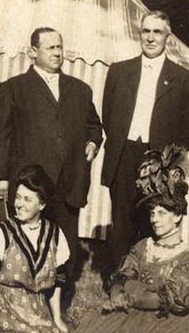
Warren Harding, stands at right, Carrie Phillips, sits at left – and their respective spouses.
Four years later, love letters were at the heart of the only known blackmail attempt, successful or otherwise, by a presidential mistress. U.S. Senator Warren Harding had expressed ambivalence about running for President in 1920 but his ambitious wife Florence Harding encouraged his candidacy, and prevented him from withdrawing after he lost the Indiana primary. At one point he finally told her that her former best friend, the married Carrie Phillips had written him a blackmail letter with specific demands if he pursued the presidency– or else she would publish all his erotic letters to her and detail their long-term truly passionate love affair. After his nomination, Jess Smith, an aide to his manager, paid Carrie Phillips $20,000 and provided her and her husband with two all-expense paid tickets for a cruise to Asia that would keep them out of the country until after the election. The cost had been underwritten by individual members of the Republican National Committee.
Although the wire service and large newspaper reporters covering Harding’s front-porch campaign in his hometown of Marion, Ohio, got local confirmation about Mrs. Phillips, none knew about the blackmail at the time. In fact, throughout most of the 19th and 20th centuries, whatever the print and later broadcast media learned about adulterous presidential candidates was deemed to either lack credibility enough to warrant concern about potential presidential blackmail or was deemed non-compromising to their stand on policy issues or the personas they crafted of themselves. Voters never learned about the likes of James Garfield and Lucia Calhoun, Franklin Roosevelt and Lucy Mercer, Lyndon Johnson and Alice Glass (to name just three) until decades after the levers had been pulled. One indignant housewife who claimed to have photographic proof that 1960 presidential candidate John F. Kennedy had made surreptitious night visits to one of her woman tenants produced only a snapshot of his back, as he walked down a street. The only publication which printed the picture was the Hollywood tabloid Confidential, but its reputation for exaggeration and hype only proved to undermine the rumor’s credibility. While the mainstream media would continue to ignore certain stories it considered irrelevant, tabloids were soon pursuing it and often making such publications legitimate news sources.
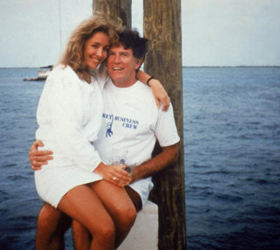
Gary Hart and Donna Rice: the picture that changed history.
All that changed in 1988 when a single photograph of Democratic candidate Gary Hart was published by the Miami Herald, showing the smiling 29-year old blonde model Donna Rice sitting on his lap. In response to rumors of his womanizing, Hart told the New York Times on May 3, 1987, “Follow me around. I don’t care. I’m serious. If anybody wants to put a tail on me, go ahead. They’ll be very bored.” Miami Herald reporters were already doing that, and seeing a girl leave his Washington home the day before his dare, went public with it the same day he made his dare to the press. Hart countered that it was outrageously speculative for them to draw a conclusion of adultery. Two days later, the newspaper got word that Hart had cruised on a yacht called Monkey Business and broke the story. Hart dropped out of the race. A month later, on June 2, the National Enquirer published the incriminating photo, Hart was even wearing a tee-shirt branded Monkey Business. With 64 percent of those surveyed in a Gallup Poll believing Hart was treated unfairly by the media, and 53 percent believing adultery had nothing to do with presidential ability, he re-entered the race in December of 1987, apologetically declaring “Let’s let the people decide!” They did. Garnering just four percent in the New Hampshire primary, he dropped out for good.
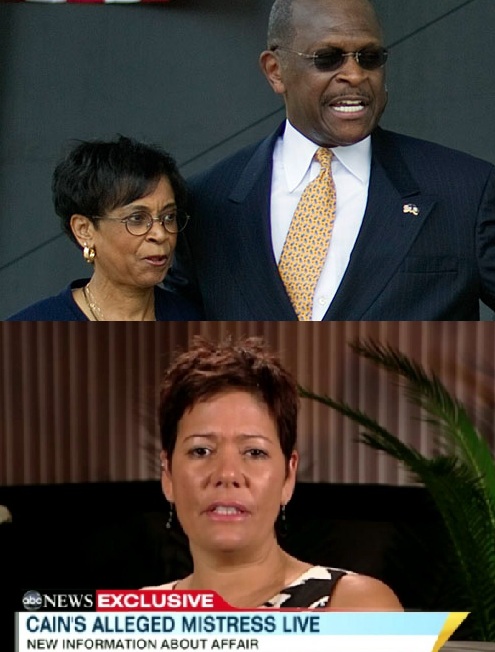
Gloria and Herman Cain and his alleged mistress Ginger White.
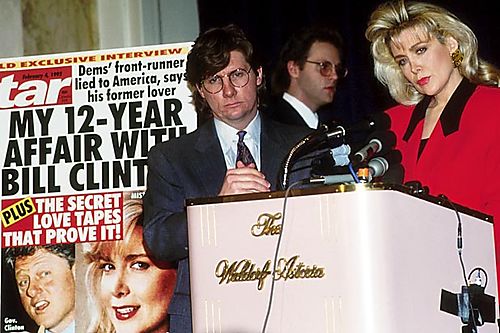
Jennifer Flowers going public about her affair with Bill Clinton during his 1992 presidential campaign.
The Donna Rice-Gary Hart incident forever changed the political landscape for presidential candidates who had or were committing adultery. Four years later, singer Jennifer Flowers went public with a National Enquirer story and press conference to reveal her affair with Arkansas Governor Bill Clinton, the leading contender for the Democratic nomination. He and his wife addressed it in a prime-time 60 Minutes interview and it to have no appreciable impact on his subsequent victory.
In contrast, 2012 Republican Presidential candidate Hermann Cain offered blanket denial of four different charges of sexual harassment or misconduct, two by unnamed sources and two by Sharon Bialek and Karen Kraushaar. When Ginger White gave a November 28, 2011 television interview and stated that she’d had a 13-year affair with Cain which had ended only before his campaign began, Cain said it was untrue. Five days later, he quit his presidential quest.
Divorce

The Presidential candidates who were previously divorced and then successfully remarried were Ronald Reagan, Bob Dole, John Kerry, John McCain.
While Newt Gingrich is the only presidential candidate who has been multiply-divorced, he’s not the first to contend with the issue. With the successfully-married Ronald Reagan becoming the first (and thus far, only) divorced man elected to the presidency in 1980, a taboo seemed broken, making way for the nominations of Republican Bob Dole in 1996, Democrat John Kerry in 2004 and Republican John McCain in 2008. Unlike the current situation, with second wife Marianne Gingrich going public with details of her marital breakup, however, none of these candidates’ divorced first wives – Jane Wyman Reagan, Phyllis Holden Dole, Julia Thorne Kerry and Carol Shepp McCain – spoke out against their former husbands and only offered public support for their candidacies.
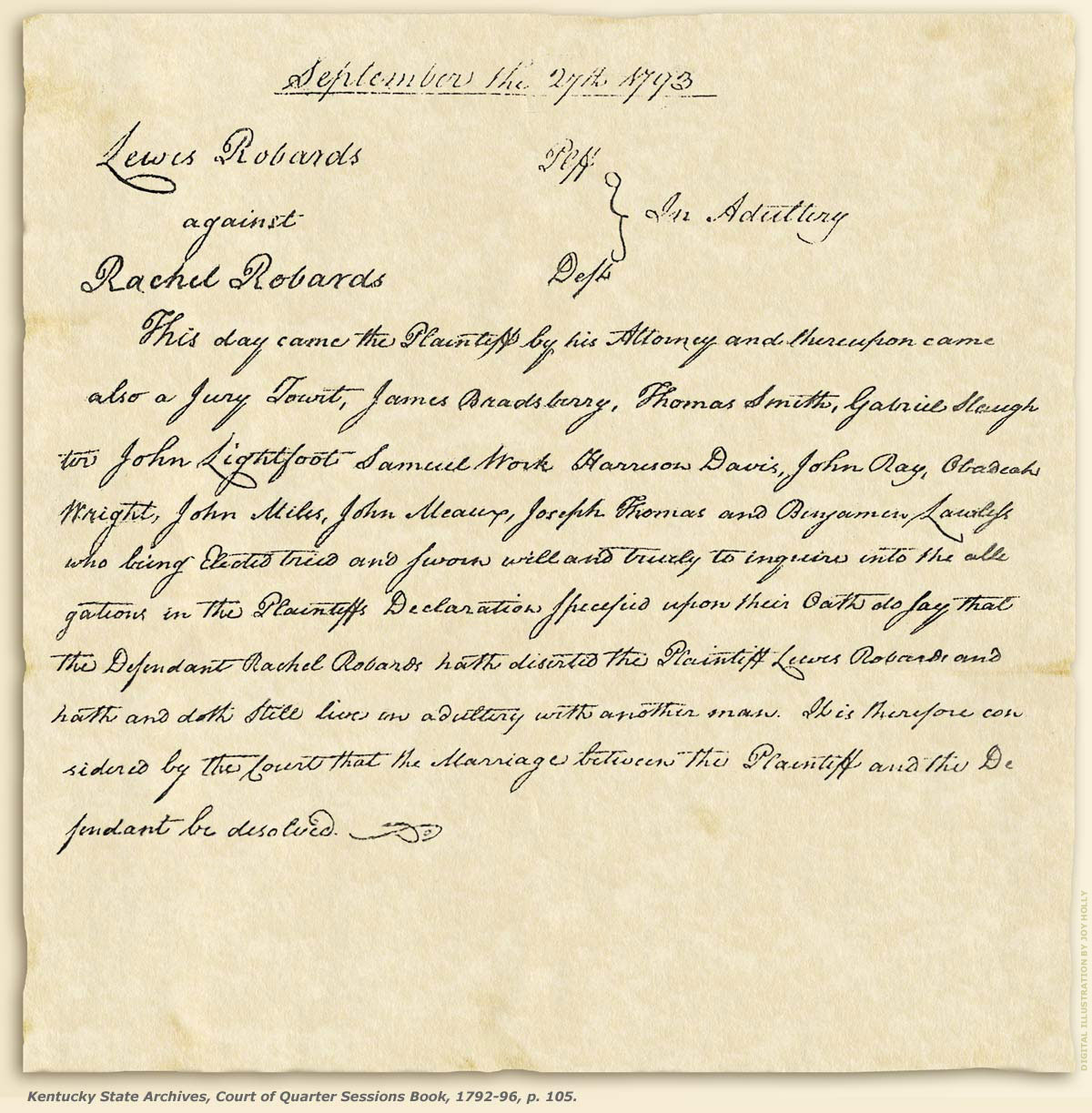
The divorce decree between Rachel Jackson and her first husband Lewis Robards.
The first time divorce became a campaign issue it involved not the presidential candidate but his wife. In 1828, Democrat Andrew Jackson found his moral character and regard for the law under attack as a result of his having married a woman who was technically a bigamist.
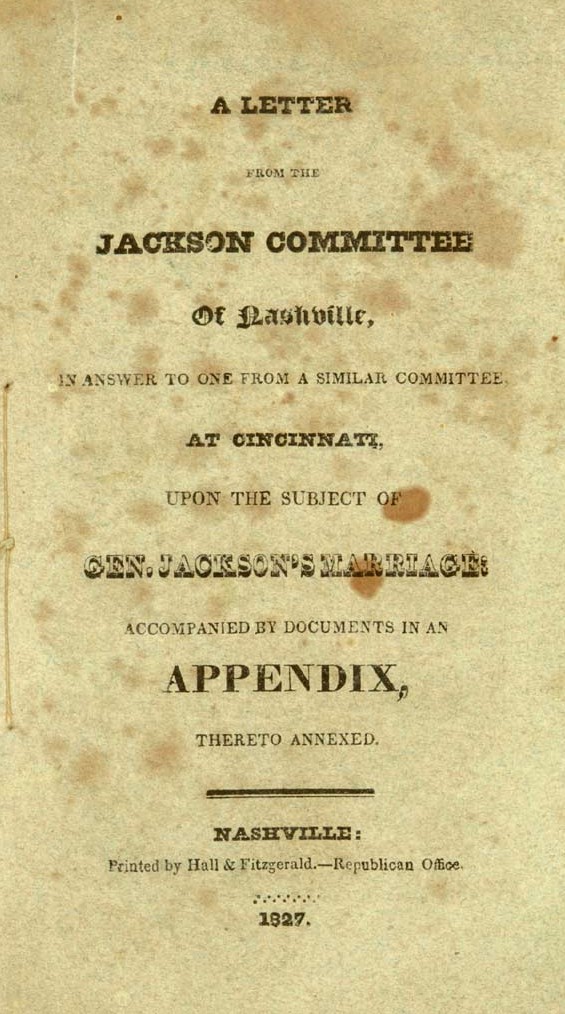 The crisis involved the divorce of his wife Rachel from her first husband Lewis Robards. Having petitioned the court in Virginia from her home in Tennessee to grant the divorce, enough time had passed that not only she but her great love, attorney Andrew Jackson presumed it had been finalized. They then married. Two years later they discovered her divorce from Robards had not been granted – and that now he was seeking to divorce her on the grounds of adultery with Jackson.
The crisis involved the divorce of his wife Rachel from her first husband Lewis Robards. Having petitioned the court in Virginia from her home in Tennessee to grant the divorce, enough time had passed that not only she but her great love, attorney Andrew Jackson presumed it had been finalized. They then married. Two years later they discovered her divorce from Robards had not been granted – and that now he was seeking to divorce her on the grounds of adultery with Jackson.

A later painting depicting the Jacksons riding at their Nashville plantation.
Supporters of incumbent President John Quincy Adams, Jackson’s opponent, used the personal matter as evidence that, at best, Jackson first marriage of his wife Rachel showed his disregard for upholding the law. The hot-tempered Jackson was outraged less by the reflection on his character than he was by the insult to Rachel by the suggestion voters should prevent an election which put “an adulteress in the White House.” His supporters crafted the first systematic campaign public relations effort, intended to uphold his character and claim it worthy of a President. To combat the issue of his “domestic relations in reference to his fitness for the presidency,” the “Nashville Central Committee,” was formed. Its primary tool was a thirty-page pamphlet of first-hand accounts presenting Robards as abusive to Rachel and that he’d abandoned her, suggesting Jackson was heroically chivalrous, if perhaps a sloppy lawyer who’d failed to first be certain her divorce had been finalized.
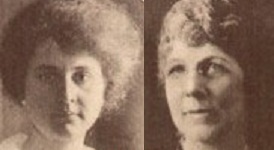
Margaretta Cox, wife of the previously divorced Democratic candidate and Florence Harding, previously divorced wife of the Republican candidate..
The managers of the first presidential candidate to have been divorced feared his nomination was a matter of bad timing. 1920 was the first year women were given the right to vote and the male political bosses and newspaper editors were filled with fear about what issues would affect their candidate of choice. Despite the fact that the divorce of Democratic candidate, Ohio Governor James Cox had been legally obtained and was known in his hometown of Dayton, it had not yet become widely disseminated at the start of the campaign. The claims of mistresses and illegitimate children about Republican candidate, Ohio’s U.S. Senator Warren Harding which the National Democratic Party learned from an Wooster operative were of less interest than the fact that his wife Florence had been divorced. As the Democratic Vice Presidential candidate Franklin D. Roosevelt told the president of Harvard University, it the Republicans made an issue of Mr. Cox’s divorce, the Democrats would make an issue of Mrs. Harding’s divorce. Both political parties honored the dishonors.
For once, at least, Warren Harding could not be blamed.
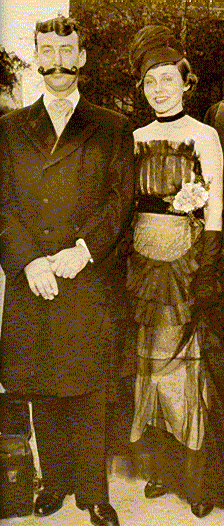
A rare photograph of Ellen Stevenson with her husband Adlai at far left, at a costume party they hosted (Princeton University)
The first time the American people were fully informed about a candidate’s divorce was the 1952 candidacy of Democrat Adlai Stevenson.
Ellen Waller Stevenson was the daughter of wealthy Chicago founding families, stepdaughter of a composer, educated in England and devoted to classical piano, once even performing for the King of England in Buckingham Palace.
After marrying Stevenson in 1928, and bearing him three sons, she performed as a political wife, helping campaign for his 1948 victory as Illinois governor, “in the most polite way possible,” she said. Ellen Stevenson so hated politics, she vowed that if he wished to further pursue politics, he could do it alone.
Three years before he officially became a presidential candidate, Ellen Stevenson made good on her threat, flew to Reno and divorced Adlai. She went on to help found Chicago’s Poetry Magazine and create an Art Center in what had been her childhood home.
Even though Stevenson did not remarry like Gingrich, there may be some warning in what happened next.
When her ex-husband won the Democratic nomination, Ellen Stevenson offered not only her personal “congratulations” but her one and only political opinion: she hoped her fellow Americans would “vote Republican out of principle.”
And they did, defeating her husband.
Related articles
- The Complete ABC News Interview With Marianne Gingrich. Just What Newt Needed (whitehouse12.com)
- Newt Gingrich Responds to Ex-wife Cheating Scandal at South Carolina Debate – Watch Now ! (binsidetv.net)
- False Tones and Family Values (notesandobservations.me)
- Newt Gingrich Wins South Carolina and Becomes the Undisputed Alternative to Mitt Romney (whitehouse12.com)
Categories: Barack Obama, The Wilsons, Woodrow Wilson
Tags: 2012 Presidential Campaign, Barack Obama, Gingrich, James G. Blaine, John Edwards, National Enquirer, Newt Gingrich, Richard Mentor Johnson, Woodrow Wilson
 Ivana Be First Lady: Trump Wives Tales, A President Who Married His Niece & Other Multiple-Wife Presidencies
Ivana Be First Lady: Trump Wives Tales, A President Who Married His Niece & Other Multiple-Wife Presidencies  100 Forgotten Pictures of Presidential Family Life 100 Years Ago: The Tafts & Wilsons
100 Forgotten Pictures of Presidential Family Life 100 Years Ago: The Tafts & Wilsons 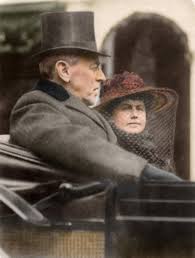 Five Presidents Who Went to War & Killed Themselves For It: Wilson (Part 3)
Five Presidents Who Went to War & Killed Themselves For It: Wilson (Part 3) 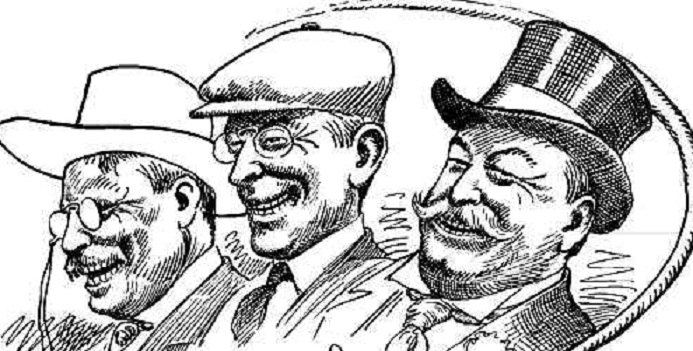 When Three Presidents Ran Against Each Other But Whiskey Won the Election: The 1912 Campaign Songs of Teddy Roosevelt, Taft & Wilson
When Three Presidents Ran Against Each Other But Whiskey Won the Election: The 1912 Campaign Songs of Teddy Roosevelt, Taft & Wilson 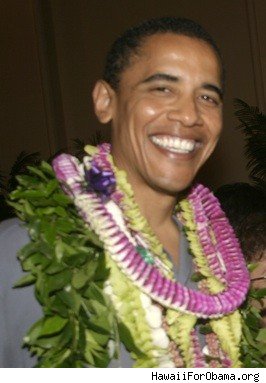 Obama’s Regional Identity Conflict: A Matter of Presidential Legacy
Obama’s Regional Identity Conflict: A Matter of Presidential Legacy 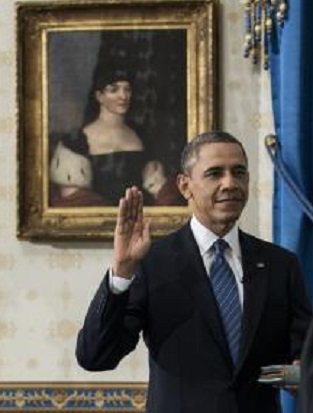 That Mysterious Woman at Obama’s Sunday Inaugural Ceremony & Historical Context
That Mysterious Woman at Obama’s Sunday Inaugural Ceremony & Historical Context
“A Child By Coolidge?”
Tomorrow I leave for Florida and three weeks at the historic Lakeside Inn in Mount Dora where former President and Mrs. Coolidge spent a month in 1930. It has been proposed that “President Coolidge” have an exchange with a Mr. Gingrich on the lawn of Lakeside Inn on Thursday morning. (Mr. Gingrich is running for president.) As you know, I would not choose to speak for the president but have indicated my believe that he will comply with this request.
In 1930, the Coolidges left Florida and went on to California to spend a week at William Randolph Hearst’s ranch – San Simeon. In later years, when in her cups, Mr. Hearst’s friend and companion the delightful Marion Davies would speak of her son. Friends would say, “Marion. You know that you never had any children.” Miss Davies would insist that indeed she had! She was speaking of the child she had by Coolidge.
Too funny….the Marion Davies part, not the Florida part….Florida is not funny this time of year…it is sacred with sunshine and salt water, even to Californians…..I hope Mr. Coolidge will remove his wingtips for a toe dip in the sea.